| Listing 1 - 10 of 45 | << page >> |
Sort by
|
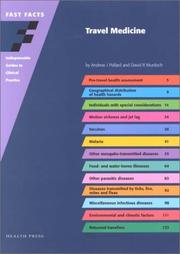
ISBN: 1912776065 1899541594 Year: 2001 Publisher: Basel : S. Karger,
Abstract | Keywords | Export | Availability | Bookmark
 Loading...
Loading...Choose an application
- Reference Manager
- EndNote
- RefWorks (Direct export to RefWorks)
Travellers depend upon their family physician and practice nurse for essential advice in planning travel and practitioners need to be able recognise an increasing array of diseases in a new, mobile population. The explosion in international tourism fuelled by fast, cheap transport has meant that the specialty of travel medicine has had to evolve rapidly. Travel medicine now extends well beyond infections in warm climates and includes exposure to new environments, new cultures, new hazards, and new medical problems including emerging and re-emerging infections. 'Fast Facts: Travel Medicine' is an invaluable practice resource which provides expert practical coverage of all aspects of health problems that may be incurred during travel abroad. It focuses on the provision of sound, personalised advice in the areas of preparation, risk- assessment, planning and personal responsibility. This fact-filled, accessible guide will see near-constant use in the primary healthcare setting. Contents: • Pre-travel health assessment • Geographical distribution of health hazards • Individuals with special considerations • Motion sickness and jet lag • Vaccines • Malaria • Other mosquito-transmitted diseases • Food- and water-borne illnesses • Other parasitic diseases • Diseases transmitted by ticks, lice, mites and fleas • Miscellaneous infectious diseases • Environmental and climatic factors • Returned travellers

ISBN: 9781912776061 9781899541591 Year: 2001 Publisher: Basel S. Karger
Abstract | Keywords | Export | Availability | Bookmark
 Loading...
Loading...Choose an application
- Reference Manager
- EndNote
- RefWorks (Direct export to RefWorks)

ISBN: 9781912776061 9781899541591 Year: 2001 Publisher: Basel S. Karger
Abstract | Keywords | Export | Availability | Bookmark
 Loading...
Loading...Choose an application
- Reference Manager
- EndNote
- RefWorks (Direct export to RefWorks)
Travellers depend upon their family physician and practice nurse for essential advice in planning travel and practitioners need to be able recognise an increasing array of diseases in a new, mobile population. The explosion in international tourism fuelled by fast, cheap transport has meant that the specialty of travel medicine has had to evolve rapidly. Travel medicine now extends well beyond infections in warm climates and includes exposure to new environments, new cultures, new hazards, and new medical problems including emerging and re-emerging infections. 'Fast Facts: Travel Medicine' is an invaluable practice resource which provides expert practical coverage of all aspects of health problems that may be incurred during travel abroad. It focuses on the provision of sound, personalised advice in the areas of preparation, risk- assessment, planning and personal responsibility. This fact-filled, accessible guide will see near-constant use in the primary healthcare setting. Contents: • Pre-travel health assessment • Geographical distribution of health hazards • Individuals with special considerations • Motion sickness and jet lag • Vaccines • Malaria • Other mosquito-transmitted diseases • Food- and water-borne illnesses • Other parasitic diseases • Diseases transmitted by ticks, lice, mites and fleas • Miscellaneous infectious diseases • Environmental and climatic factors • Returned travellers
Book
Year: 2001 Publisher: New York, N.Y. Churchill Livingstone
Abstract | Keywords | Export | Availability | Bookmark
 Loading...
Loading...Choose an application
- Reference Manager
- EndNote
- RefWorks (Direct export to RefWorks)
Book
Year: 2001 Publisher: Waterloo Bristol-Myers Squibb Belgium
Abstract | Keywords | Export | Availability | Bookmark
 Loading...
Loading...Choose an application
- Reference Manager
- EndNote
- RefWorks (Direct export to RefWorks)
Book
ISBN: 1899015434 Year: 2001 Publisher: Haslemere Euromed Communications
Abstract | Keywords | Export | Availability | Bookmark
 Loading...
Loading...Choose an application
- Reference Manager
- EndNote
- RefWorks (Direct export to RefWorks)
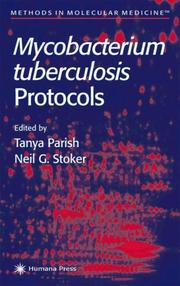
ISBN: 1280821124 9786610821129 1592591477 0896037762 Year: 2001 Publisher: Totowa, NJ : Humana Press : Imprint: Humana,
Abstract | Keywords | Export | Availability | Bookmark
 Loading...
Loading...Choose an application
- Reference Manager
- EndNote
- RefWorks (Direct export to RefWorks)
With one-third of the world's population infected with Mycobacterium tuberculosis, over two million people a year dying from tuberculosis, and the appearance of multidrug-resistant strains, the need to understand the biology of M. tuberculosis, and so to develop new interventions, has become acute. In Mycobacterium tuberculosis Protocols, leading investigators with extensive practical knowledge and experience describe their best methods for studying this dangerous pathogen. Packed with step-by-step instructions to ensure successful results, these methods range from basic handling techniques to the application of functional genomics. These molecular techniques are suitable for research in genetics, biochemistry, microbiology, cell biology, epidemiology, and diagnostics, and are at the forefront of biological research as a whole, as well as in focused M. tuberculosis research. Highlights include methods for the basic safety and culture of M. tuberculosis, fractionation of the bacterium (nucleic acids, lipids, culture filtrate, and capsule), the analysis of gene expression (start-site mapping, real-time PCR, microarrays, and proteomics), the growth of the bacterium in macrophages and low oxygen, cytological analysis of the bacteria, and diagnostics. Highly practical and accessible, Mycobacterium tuberculosis Protocols utilizes advanced functional genomics and mutagenesis methodologies to provide both experimental and clinical investigators all the powerful techniques needed to illuminate the molecular biology of tuberculosis and its interactions with host cells, and so drive work on the wide variety of emerging therapeutic opportunities.
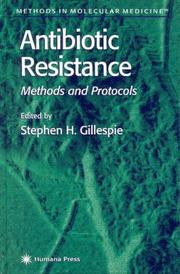
ISBN: 0896037770 9786610820672 1280820675 1592590772 Year: 2001 Publisher: Totowa Humana Press Inc.
Abstract | Keywords | Export | Availability | Bookmark
 Loading...
Loading...Choose an application
- Reference Manager
- EndNote
- RefWorks (Direct export to RefWorks)
At a time of rising concern about drug resistance and falling output of new antibacterial compounds, antibiotic research has once again returned to the forefront of medical science. In Antibiotic Resistance: Methods and Protocols, Stephen Gillespie and a panel of leading clinical and diagnostic microbiologists describe a series of detailed molecular and physical methods designed to study the growing problem of antibiotic resistance, as well as facilitate new antibiotic research programs for its effective redress. The techniques range widely from those that provide rapid diagnosis via DNA amplification and phage display, to those for plotting the transmission of resistant organisms and investigating their epidemiology. The methods are readily adaptable to a wide range of resistant bacterial organisms. In order to ensure successful results, each method is described in minute detail and includes tips on avoiding pitfalls. Practical and wide-ranging, Antibiotic Resistance: Methods and Protocols provides a collection of indispensable techniques not only for illuminating the basic biology of antimicrobial resistance, but also for developing and implementing new diagnostic and epidemiological tools.
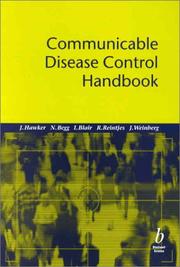
ISBN: 0632056495 Year: 2001 Publisher: Oxford Blackwell
Abstract | Keywords | Export | Availability | Bookmark
 Loading...
Loading...Choose an application
- Reference Manager
- EndNote
- RefWorks (Direct export to RefWorks)
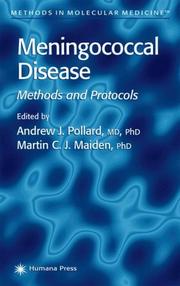
ISBN: 0896038491 9786610821143 1280821140 1592591493 Year: 2001 Publisher: Totowa Humana press
Abstract | Keywords | Export | Availability | Bookmark
 Loading...
Loading...Choose an application
- Reference Manager
- EndNote
- RefWorks (Direct export to RefWorks)
Neisseria meningitidis is a major cause of childhood morbidity and mortality in industrialized nations and is responsible for epidemics of meningococcal meningitis and septic shock in Africa and Asia. In Meningococcal Disease: Methods and Protocols, Andrew Pollard and Martin Maiden bring together a panel of leading authorities to produce a comprehensive, interdisciplinary survey of recent advances and knowledge about this much-feared disease. The review and methods-based chapters collected here provide essential information for diagnosis in the clinical microbiology laboratory, isolate characterization, clinical management, and control of meningococcal disease. They also examine the immunopathological mechanisms occurring in the acutely ill, host-pathogen interactions, and the possible components of meningococcus responsible for virulence. A companion volume, Meningococcal Vaccines, provides detailed methods for the design and evaluation of meningococcal vaccines. Comprehensive and authoritative, Meningococcal Disease: Methods and Protocols integrates the basic science and the clinical and epidemiological aspects of this terrible infectious disease to promote the deeper understanding needed to identify novel targets for therapeutic interventions and vaccines.
Meningitis, Meningococcal --- diagnosis. --- therapy. --- diagnosis --- therapy --- Emerging infectious diseases. --- Infectious Diseases. --- Emerging infections --- New infectious diseases --- Re-emerging infectious diseases --- Reemerging infectious diseases --- Communicable diseases
| Listing 1 - 10 of 45 | << page >> |
Sort by
|

 Search
Search Feedback
Feedback About UniCat
About UniCat  Help
Help News
News